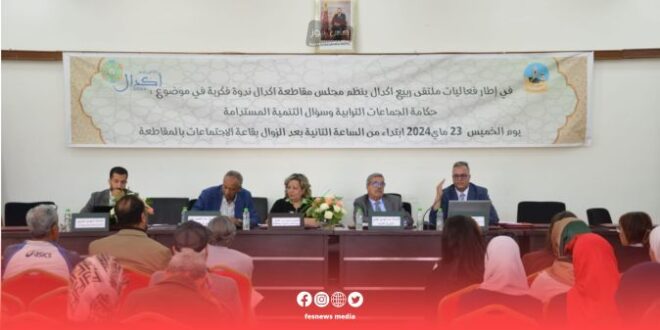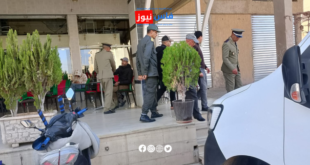Yesterday, Thursday, May 23, 2024, the Great Hall of Agdal district in Fez hosted an intellectual symposium, entitled Governance of Territorial Communities and the Question of Sustainable Development.
The seminar, programmed as part of the activities of the Agdal Spring Forum 2024, was moderated by a number of prominent local and national doctors in the field of law, such as Professor Abdellatif Rafou, Dr. Abdellatif Rafou, doctor of law and lawyer at the Fez Court, president of the National Prison Observatory, and vice president of the Agdal district, as well as Dr. Abdelhadi Al Hilali, doctor of law and visiting professor at the Faculty of Law in Fez, Dr. Al Mahdi Al Azouzi, lawyer at Fez Court and visiting professor at the Faculty of Law in Fez, and Professor Abdelhay Ghorba, lecturer at the Faculty of Law at Hassan II University in Casablanca, in addition to Professor Abdelhay Ghorba.
The seminar was attended by a group of elected officials, administrative staff of the Fez Community and the New Fez Mashour Community, as well as research students and civil society actors.
The interventions of the lecturers were differentiated and distinguished, and most of them focused on simplifying the concept of governance in territorial communities, according to a purely legal-administrative-ethical crystallization, in close connection with the reality of territorial communities and their constraints, which prevent the achievement of efficiency and hinder the implementation of public policies.
Dr. Abdelhaye Gharba, a lecturer at the Faculty of Legal, Economic and Social Sciences at Hassan II University in Casablanca, spoke about the principle of unloading, describing it as one of the components of governance with a specific philosophy, pointing out that the state’s relationship with territorial communities requires us to consider how the state deals with territorial communities, especially the control of competence, noting in the same context that the biggest issue in territorial communities is that citizens demand a set of competencies from the heads of territorial communities, which makes the heads of the
According to the same speaker, the reports of the High Council of Accounts identify the constraints facing local authorities in the management of human resources, as responsibility is assigned without a decision, and compensation is given to deputies or employees without a legal basis, which raises the issue of legal and ethical follow-up.
The professor concluded his intervention with proposals to avoid risks related to the internal management of the territorial community, such as the introduction of an internal audit system within the administration of the communities, as well as the creation of an experienced cell, indicating that the organization within the territorial communities should be by decisions, which will contribute to the establishment of the principle of governance, in addition to the need to digitize all facilities of the territorial communities, which will contribute to the ethics and management of the facility.
Among the most prominent interventions was also the intervention of Dr. Mahdi Azouzi, who pointed out that talking about development raises talk about development at all levels and fields, and the state today is trying to make all communities economic, but the way communities are managed and how the majority do not have levels of management, and the economic power is dominant for them and not competence, all of which makes the state afraid of missing the opportunity for management and governance, all of which makes the state afraid of missing the opportunity for management and governance.
In the same context, he pointed out that there are about 68 decrees and laws, all related to governance and how to consolidate it, so if the person is not able to manage the elected institution, we will reach the stage of no return and Fez is a model, due to the incompetence of a large percentage of the elected, according to his description, and he pointed out that the assessment of territorial governance requires the consolidation of the principle of decentralization.
According to the same speaker, he warned of the absence of a legal text that binds the community and the state to contracts, as well as the absence of provisions that authorize the principle of cooperation, stressing in the same context the need to preserve the principle of tribal oversight, as the legislator stipulated in a set of laws to ensure tribal oversight.
The seminar concluded with the opening of the floor to the audience.
By : Abdullah Cherkaoui
Source : Fez News Media
 فاس نيوز ميديا جريدة الكترونية جهوية تعنى بشؤون و أخبار جهة فاس مكناس – متجددة على مدار الساعة
فاس نيوز ميديا جريدة الكترونية جهوية تعنى بشؤون و أخبار جهة فاس مكناس – متجددة على مدار الساعة













